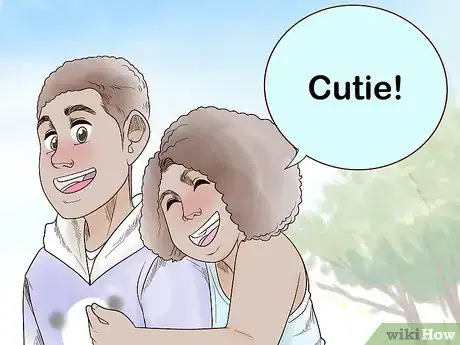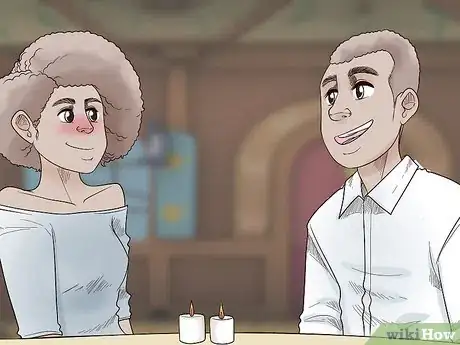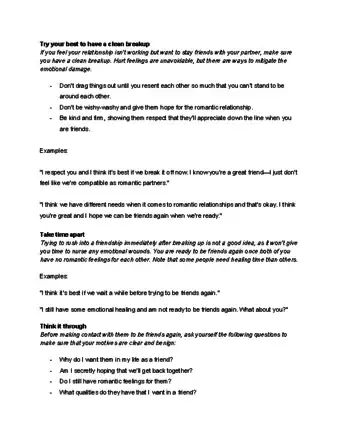This article was co-authored by John Keegan. John Keegan is a dating coach and motivational speaker based in New York City. He runs The Awakened Lifestyle, where he uses his expertise in dating, attraction, and social dynamics to help people find love. He teaches and holds dating workshops internationally, from Los Angeles to London and from Rio de Janeiro to Prague. His work has been featured in the New York Times, Humans of New York, and Men's Health.
This article has been viewed 420,968 times.
If you find yourself developing feelings for someone, you probably feel excited but also maybe a little nervous about what to do next. That's okay—those feelings are just a sign of how important this person is to you. You're off to a good start, though, because a strong friendship is a great foundation to build a relationship on. Our guide will walk you through the things that may make it easier for the two of you to transition from friends to partners.
Steps
Get really clear on what you're feeling.
-
Make sure your motivations are pure and not temporary. Think about your current state of mind and life circumstances and ask yourself if your romantic feelings might be caused by these factors. Sometimes life events can cause people to seek comfort, stability, excitement, or validation from other people in our lives who they don't genuinely want to be with. Avoid pursuing a relationship with your best friend if you might be using them to feel better.
- For instance, you may seek comfort and distraction in a romance with your best friend after a death in the family.
Tell them you like them if they don't know.
-
State your interest simply if you are still just friends. If your friend doesn't know that you have a romantic interest in them, tell them in a straightforward but non-threatening way. Explain that you are attracted to them and want to pursue a romantic relationship with them. Make it clear that you will understand if they don't feel the same way but that you wanted to be honest about your feelings either way.
- For instance, say, "I have strong feelings for you and I want to be more than just a friend, but I will totally understand if you aren't interested in taking things to the next level."
- An unrequited crush can put tension on a friendship over time, so it is good to be honest regardless of the outcome.
- Avoid gestures that can overwhelm your friend. Lunging in for a kiss all of a sudden or showing up with flowers at their window is not the best idea.
Share your concerns about dating them.
-
It can feel risky to move from friendship to romance. Share any worries you have about losing your close relationship to see if they feel the same way. Ask if there are any other concerns about the situation that they have to get a clear understanding of what obstacles may be facing you both.
- For example, say something like, "You're my best friend and I'm not sure if my romantic feelings for you are worth losing you entirely."
Establish boundaries for your new relationship.
-
Boundaries can help you avoid misunderstandings. Communicate your romantic wants and needs clearly to your partner from the start. Avoid the assumption that they will intuitively know how what will be okay with you and make you happy. Be sure to outline any behaviour that you consider unacceptable from a romantic partner so they know how you want to be treated.[1] X Research source
- For instance, say something like, "I believe in monogamy and I can't tolerate cheating in a romantic relationship."
Avoid making assumptions about what your partner wants.
-
Give it a fresh start, like any other new relationship. After transitioning from friendship to a relationship, you may think that you already know what your partner wants romantically. Always check with your partner to see what goals and desires they have as these may change over time, and in different situations. If you catch yourself guessing what they might like, stop and ask them about it to double check. They will appreciate your effort and concern about their feelings.
- For instance, if your partner noted in the past that they didn't want a co-dependent relationship, do not assume that they want you to keep your distance.
Give the relationship time to unfold.
-
Avoid getting physically intimate until you are sure of your chemistry. Take things slowly so you can both figure out your feelings without distractions. Romantic touching and sexual contact can blur the lines of a relationship and confuse boundaries. Try to let your physical relationship evolve naturally out of genuine chemistry and affection.[2] X Research source
- Acting on physical urges too soon may make the situation awkward or increase the intensity of your relationship very quickly.
Be consistent.
-
Wavering back and forth can confuse your friend. Moving slowly is a good way of avoiding confusing hot-and-cold behaviour. Making a grand romantic move one week, then acting like a casual buddy the next will leave your friend unsure of your feelings. Take things slow and gradually build up to bigger gestures or commitments so you won't be overwhelmed by the situation.
- For instance, don't show up to your friend's workplace with flowers one day and introduce them to colleagues as your "buddy" a few days later.
Give each other space sometimes.
-
Every relationship needs a little breathing room. Taking things to the next level with your best friend can reinforce an already strong bond, making it tempting to spend all of your time with them. Take some time apart to pursue your own interests and to make sure that you get the chance to miss each other. This will make you appreciate each other even more while reducing the risk of becoming annoying to each other.[3] X Research source
- For example, take time to visit with other friends or spend some quiet time alone at home.
Give them a pet name.
-
Start calling them nicknames that are flirty or affectionate. Casual nicknames that you call a friend may give them the impression that you are not interested in them. Instead, try to call them pet names that convey that you think they are special or attractive. This will help transition your relationship from friendship to love.[4] X Research source
- For instance, call them something like "sweetheart," "cutie," or "gorgeous."
- Avoid casual names like "buddy," "pal," or "dude."
Put effort into impressing them.
-
Go the extra mile even if you're comfortable together. Friendship means a certain level of familiarity and comfort that may not scream "romance." Aim to impress them the same way you would try to win over a blind date or a cute stranger. Add intrigue to the relationship to keep and increase their interest.[5] X Research source
- For instance, dress up for outings the same way you would for a romantic date with someone you are just getting to know.
Pursue more romantic activities while you are together.
-
Change things up so it feels like dating. A good way to shift your relationship from friendship to romance is to change your routine together. Create excitement by spending time in situations or places you have never been to. Avoid having "dates" that involve activities you did together as friends, such as playing video games or sports.[6] X Research source
- For example, go out for a romantic candlelit dinner or share a bottle of wine instead of ordering a pizza.
Plan a romantic trip together.
-
Vacations are an amazing way to celebrate your love. While you may have done many activities together as friends, a shared getaway is a distinctly romantic thing to do. Plan a small vacation for you and your partner to spend some one-on-one time together. Whether it is a short road trip or a more elaborate getaway, the experience will bond you on a new level.[7] X Research source
- To avoid potential conflicts, start by going away for a few days at a time with your partner then build up to longer trips.
Help Communicating with Your Best Friend about Dating
References
- ↑ https://psychcentral.com/blog/why-healthy-relationships-always-have-boundaries-how-to-set-boundaries-in-yours/
- ↑ https://www.independent.co.uk/life-style/love-sex/dating-friend-true-love-secret-tips-relationships-a7863251.html
- ↑ https://www.independent.co.uk/life-style/love-sex/relationship-spark-partner-boyfriend-girlfriend-tips-guide-fuel-dating-skills-space-a7943076.html
- ↑ https://www.glamour.com/story/8-ways-to-transform-a-friendsh
- ↑ https://www.glamour.com/story/8-ways-to-transform-a-friendsh
- ↑ https://www.glamour.com/story/8-ways-to-transform-a-friendsh
- ↑ https://www.independent.co.uk/life-style/love-sex/relationship-spark-partner-boyfriend-girlfriend-tips-guide-fuel-dating-skills-space-a7943076.html




















